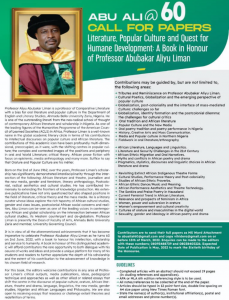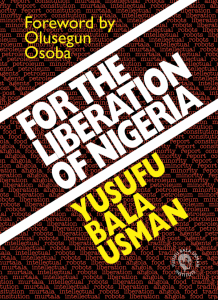The masterminds behind the ‘Prof Abu Ali @ 60’ have sent a sharp reaction on the piece, blasting Intervention for its objections. The rejoinder titled “Essays in Honour of Prof Abu Ali?…” Yes please; away with antiquated musing” is published unedited below. Curiously, the editors who made so much fuss about the earlier piece carrying no byeline did not sign the rejoinder too. But, here we go:
 If the words, ‘presumptive’, ‘pedantic’ and ‘antique’ had a face then that face would have been the greatly flawed musing of the Intervention’s publication on the planned book collection to honour Professor Abubakar Aliyu Liman of the Department of English at ABU Zaria. For anything, the article which the nameless author titled Essays in Honour of Prof Abu Ali? Please, Do Something Else…” is a pathetic piece of writing that shows the insularity of journalism in Nigeria; and worse, exhibit the spirit of a failed radicalist seeking for lost glory. The article can pass as a recycling of the many discussions about Festschrift that we have encountered in different academic platforms in Nigeria with the aristocratic and newly minted self-styled radicals, schooled by unrepentant old-fashioned generation, displacing book anthologies for doyens.
If the words, ‘presumptive’, ‘pedantic’ and ‘antique’ had a face then that face would have been the greatly flawed musing of the Intervention’s publication on the planned book collection to honour Professor Abubakar Aliyu Liman of the Department of English at ABU Zaria. For anything, the article which the nameless author titled Essays in Honour of Prof Abu Ali? Please, Do Something Else…” is a pathetic piece of writing that shows the insularity of journalism in Nigeria; and worse, exhibit the spirit of a failed radicalist seeking for lost glory. The article can pass as a recycling of the many discussions about Festschrift that we have encountered in different academic platforms in Nigeria with the aristocratic and newly minted self-styled radicals, schooled by unrepentant old-fashioned generation, displacing book anthologies for doyens.
The writer takes the readers down the lane of hierarchical structuration drawing from radical-historical intellection in a way that reinforces the antiquarian musing of ‘the old is always better than the new’. Otherwise how would one explain the notion that “Some academics are up to a book to be called Abu Ali @60. It is an objectionable project from beginning to the end.” No sir! What is objectionable is your attempt to create your own centre by displacing the other. This thought itself is one of the most narrow-minded that I have come across within the last one month. Let me critique the critique of the failed radicalist; better known as Mr John Doe since he is not bold enough to associate his name to the article.
The titling of the article exposes the presumptive temperament of John Doe likeable to J.P Clark’s Temugedege and most likely, its antipathy to up-to-the-minute reality and thinking. “Essays in Honour of Prof Abu Ali? Please, Do Something Else” is highly presumptive. What if there are many other programmes lined up for the celebrant and the book collection is just one of the aspects of the many academic activities planned. If there is one thing the organisers should be commended for, it is their ability to consult widely going as far as reaching out to those of us in town – traditional popular culturalists, folkists, as well as the traditional bardists to document aspects of traditional performances, languages and culture that have hitherto not received critical attention. This is one of the Call for Chapters that attempt a documentation of the practices of town and gown; and not the “cheapening” of knowledge as the blinkered writing suggest.
 Again, the opening speech of the article is absurd in that the writer advices the “masterminds” of the celebration to “look for something more imaginative to write about, using Prof Abu Ali to illustrate such a theme”. One wonders what the book collection is about in the first place considering the title or nature of the call for chapters. What could be more imaginative than writing itself! Since the writer went to school, we expect that he would know the depth of imagination that goes into writing a line. Reading the article, one gets the feeling that the writer must have slept over some bottles not to have seen the title of the supposed book on the picture which he used to illustrate the article. Or, could it be that our failed radicalist, or is it his publishers, are suffering from ‘journalistic attention deficiency syndrome (JADS)? Otherwise, how could a book be titled Abu Ali @60 as he states in the opening sentence! Where in the world is a book given such a title? The writer’s refusal to accept progress and positive change within the University system is clearly convened. Furthermore, the article conveys the rascality of a failed radical, embittered by the progress of 21st century’s avant-gardists.
Again, the opening speech of the article is absurd in that the writer advices the “masterminds” of the celebration to “look for something more imaginative to write about, using Prof Abu Ali to illustrate such a theme”. One wonders what the book collection is about in the first place considering the title or nature of the call for chapters. What could be more imaginative than writing itself! Since the writer went to school, we expect that he would know the depth of imagination that goes into writing a line. Reading the article, one gets the feeling that the writer must have slept over some bottles not to have seen the title of the supposed book on the picture which he used to illustrate the article. Or, could it be that our failed radicalist, or is it his publishers, are suffering from ‘journalistic attention deficiency syndrome (JADS)? Otherwise, how could a book be titled Abu Ali @60 as he states in the opening sentence! Where in the world is a book given such a title? The writer’s refusal to accept progress and positive change within the University system is clearly convened. Furthermore, the article conveys the rascality of a failed radical, embittered by the progress of 21st century’s avant-gardists.
For the purpose of clarity, the attention of the publisher should be drawn to the call for chapters itself. I took my time to read through it and there is no where the organizers mentioned Festschrift. Not that the idea of Festschrift is wrong in itself, but that there is a difference, however thin, between a Festschrift and Book Chapters. To mix them up and to write as if they are one and the same shows the languor of the writer as well as its publishers. From the article, all that John Doe craves for is what the organizers are about – the gown meeting the town and the emerging episteme therein.
 The failed radicalist further went south when he claims that “no such book exists in honour of Prof. Tanimu Abubakar, Abu Ali’s senior and teacher”. Is it not embarrassing and shameless of him to drag the name of Prof. Tanimu Abubakar into his ranting? I am sure Professor Taninu Abubakar would not be excited to be dragged this way. The failed radicalist must be so bitter that he did not stop to think about the implications of his goof. Again, for clarity, it is not the responsibility of the organizers to call for papers on behalf of Prof. Tanimu Abubakar. Perhaps the failed radicalist alias John Doe can go ahead and do so since he is so pained; or at least, mobilize Prof Tanimu Abubakar’s colleagues and students to celebrate him. Or is that too much to ask for since: “nothing stops anyone from celebrating their favoured scholar…and it is a matter of choice and personal appreciation of a scholar”.
The failed radicalist further went south when he claims that “no such book exists in honour of Prof. Tanimu Abubakar, Abu Ali’s senior and teacher”. Is it not embarrassing and shameless of him to drag the name of Prof. Tanimu Abubakar into his ranting? I am sure Professor Taninu Abubakar would not be excited to be dragged this way. The failed radicalist must be so bitter that he did not stop to think about the implications of his goof. Again, for clarity, it is not the responsibility of the organizers to call for papers on behalf of Prof. Tanimu Abubakar. Perhaps the failed radicalist alias John Doe can go ahead and do so since he is so pained; or at least, mobilize Prof Tanimu Abubakar’s colleagues and students to celebrate him. Or is that too much to ask for since: “nothing stops anyone from celebrating their favoured scholar…and it is a matter of choice and personal appreciation of a scholar”.
It is reticent thinking like the one peddled by our failed radicalist that inhibited the canonization of the works of scholars from northern Nigeria such as the late Prof. Bala Usman, late Prof. Yakubu Nasidi whom a Gedenschrift is being considered for; and for that matter Prof. Tanimu Abubakar. At best, the Intervention’s article encourages academic lethargy and immobility premised on the principle of “doing nothing because our fathers did nothing”. So, in the layman’s thinking of our failed radicalist – Professor so and so has not been celebrated (he even made a list) so why should Professor Abubakar Aliyu Liman be celebrated? How lame! Even though he acknowledged “Prof. Abu Ali’s brilliance and interesting specialization in popular culture”, what is however painful for him is the fact that he, Mr Doe, has not been celebrated nor is that likely to happen; and now, he is experiencing a meltdown as he is swallowed up in pettiness and envy. A typical case of “badbelle”!
I recall as an undergraduate student of the Faculty of Arts at Ahmadu Bello University Zaria, we all look forward to attending the faculty seminar series where scholars dazzle our young minds with their brilliance and the deconstruction of all we held in high esteem. Now, to think that none of those knowledges have been documented and studied in Nigeria is problematique. We study Chomski, Derrida, Barthes, Brecht and not Bala Usman, Yakubu Nasidi, Tanimu Abubakar, and others because we are all scared of canonizing them when their predecessors have not been canonized. This is the genesis of intellectual redundancy in Nigeria especially for us in the northern axis; and it is surprising that the sit-down-and-do-nothing “failed radicalist”, Mr John Doe belongs to that school.
Indeed, “there are some people for whom a book of essays serves the best purpose…”. The question is, who sets the standard for selection? What, or who determines those with the ecclesiastical authority to set that standard or choose such people? It is from this lens that one can see the deep flaws in Intervention’s article when it claims that “a Festschrift is a perfect goodbye” in honour of a scholar. Oh no Sir! Antiquation at its best! For the record, age has nothing to do with the practice of ‘Festschting’. It is about output sir. “Young Turks”, beg your pardon, ‘Young Nigerians’ would suffice. It is this generation of failed radicalist turned journalist, Mr John Doe that brought the Nigerian universities to its current state. They do everything to resist positive change. Come up thither and away from antiquated musing.





























1 Comments
Pingback: Prof Abu Ali Back in the News - Intervention